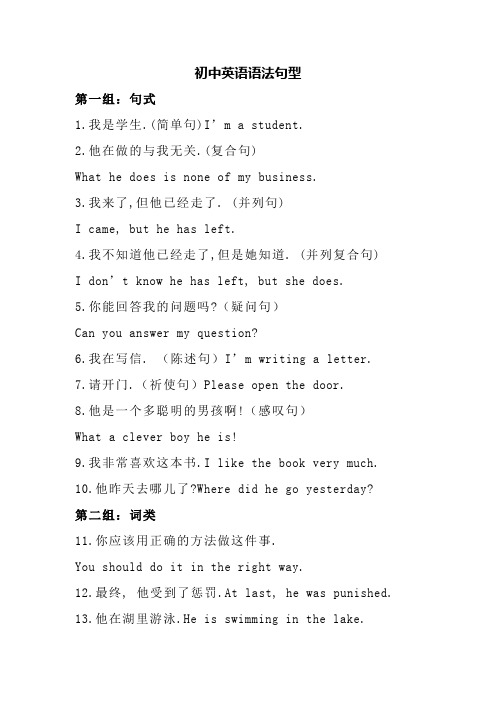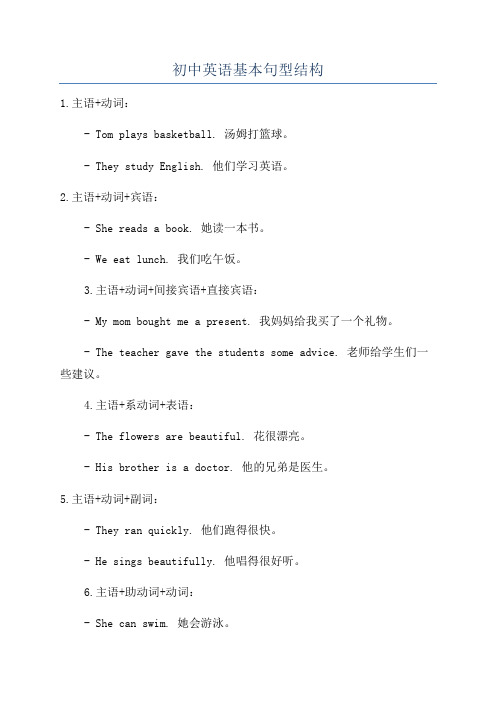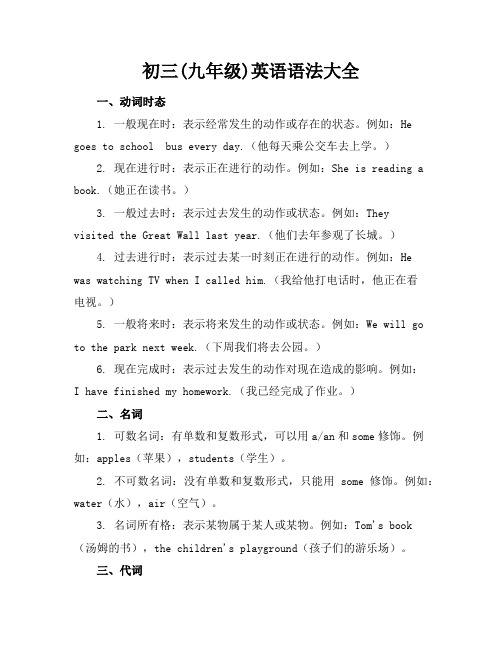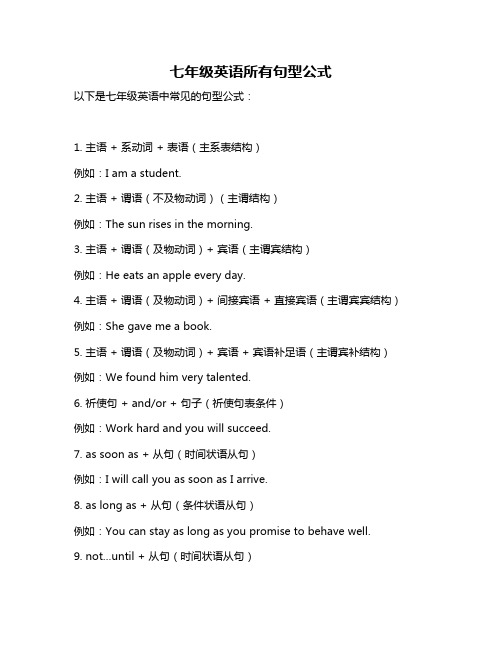初中英语109语法句型
初中英语语法句型

初中英语语法句型第一组:句式1.我是学生.(简单句)I’m a student.2.他在做的与我无关.(复合句)What he does is none of my business.3.我来了,但他已经走了. (并列句)I came, but he has left.4.我不知道他已经走了,但是她知道. (并列复合句)I don’t know he has left, but she does.5.你能回答我的问题吗?(疑问句)Can you answer my question?6.我在写信. (陈述句)I’m writing a letter.7.请开门.(祈使句)Please open the door.8.他是一个多聪明的男孩啊!(感叹句)What a clever boy he is!9.我非常喜欢这本书.I like the book very much.10.他昨天去哪儿了?Where did he go yesterday?第二组:词类11.你应该用正确的方法做这件事.You should do it in the right way.12.最终, 他受到了惩罚.At last, he was punished.13.他在湖里游泳.He is swimming in the lake.14.至今,我已经读了100部小说.So far, I have read 100 novels.15.我不喜欢这乐曲.I don’t like the music.16.你喜欢音乐吗?Do you like music?17.如果我是你, 我会跟他在一起.If I were you, I would stay with him.18.面对困难,一定要保持冷静.When facing difficulty, you should keep calm.19.最终,他梦想成真.At last, his dream came true.20.你所说的听起来很有道理.What you says sounds reasonable.第三组:词类21.我无法容忍你那样对母亲说话.I can’t have you speaking to mum that way.22.我看见他上学去了.I saw him going to school.23.他的演讲大大鼓舞了我们.His speech encouraged us greatly.24.使我们惊奇的是你不愿来.What surprised us was that you were unwilling to come.25.军人的天职是执行命令.It is a soldier’s duty to carry out orders.26.摇头意味着不同意. (v-ing作主语)Shaking heads means disagreement.27.将有一个更大的地震袭击这个国家.Another big earthquake will hit this country.28.我同意你所说的.(名词从句作宾语)I agreed with what you said.29. 我后悔告诉了你那件事.(双宾)I regret telling you that.30. 事实是他不相信我们. (名词从句作表语)The fact is that he doesn’t believe us.第四组:句子成分31. 楼上的那家人很外向.(adv 作定语)The family upstairs are outgoing.32. 我认识一个加TOM 的男孩 (过去分词作定语)I know a boy named Tom.33. 在有问题的地方做记号.(从句作状语)Make marks where you have questions.34. 我发现他仰卧在地上(v-ing 作宾补)I found him lying on his back on the ground.35. 他敞着窗睡觉, 醒着. ( adj.作状语)He slept with the window open, awake.36. 我发现他不在家. (adv.作宾补)I found him out.37. 这就是我过去工作过的那家工厂.This is the factory where I used to work.38. 他是一个学生, 一个受学生们欢迎的学生.(同位语—代词)He is a student, one who is popular with the students.39. 我的工作是教英语.(V-ing作表语)My job is teaching English.40. 我去看他却发现他不在家.(不定式作结果状语)I went to see him only to find him out.第五组:句子结构41. 他进来了. (主---谓)He came in.42. 我喜欢英语. (主---谓---宾)I like English.43. 他解决了这道难题.He worked out the difficult problem.44. 我给了他一本书.I gave him a book.45. 我把这些钱借给了他.I lent the money to him.46. 我们选他当班长.We made him our monitor.47. 什么让你那样想?What makes you think that way?48. 我们抓住他偷窃.We caught him stealing.49. 你穿这件外套很好看.You look nice in this coat.50. 这菜味道不错.The dish tastes great.第六组:冠词51. 这只马是动物.The horse is an animal.52. 一只马是动物.A horse is an animal.53. 马都是动物.Horses are animals.54. 我喜欢音乐.I like music.55. 我喜欢这曲音乐.I like the music.56. 请开门.Please open the door.57. 在这里演讲是一种荣幸.It’s an honor to give a speech here.58. 他历史知识丰富.He had a good knowledge of history.59. 在夏天跳进河里游泳是多么有趣啊!What fun it is to jump into the river and swim in summer.60. 汽车正以60公里的速度行使.The car is going at a speed of 60 kilometers an hour. 第七组:名词61. 他做了个竹窗帘. (名词作定语)He made a bamboo curtain.62. 我从学校走回家要10 分钟. (名词所有格)It’s ten minutes’ walk for me to come home from school.63. 这一次他真的犯了错. (固定)He really made a mistake this time.64. 他给我们提供了一些信息.He offered us some information.65. 同学们正在纠正试卷.The students are correcting the papers.66. 是中国最先造纸的.It is China that first made paper.67. 我将去拜访Smith 的家人.I will call on the Smiths.68. 我将去Smith家看看.I will call at the Smith’s.69. 这地图对你很有价值.The map is of great value to you.70. 他英语知识丰富.He has a good knowledge of English.第八组:代词71. 让我们讲清楚, 迟到的人是要受罚的.Let’s make it clear that the one who is late should be punished.72. 是在我工作的那家工厂我遇上他的. (强调)It was in the factory where I worked that I met him. 73. 请大声说, 以便别人能听清楚你.Please speak aloud so that you can make yourself heard.74. 中国人口比日本多.The population of China is much larger than that of Japan.75. 一个石头房子比木头房子坚固.A house of stone is much stronger than one of wood.76. 我们每一个人都应该听老师的话.Every one of us should listen to the teacher.77. 在路大两旁有许多树.There are many trees on both sides of the road. 78. 许多工厂在污水排出之前几乎没有采取措施.Little has been done before polluted water goes into the river from many factories.79. 我有两个妹妹, 一个是老师,而另一个是护士.I have two sisters. One is a teacher while the other is a nurse.80. 她听到一声巨响,这使她震惊不以.She heard a loud noise, which made her frightened. 第九组:形容词,副词81. 我在街上偶然遇到了一个三岁的小孩. (复合adj.)I came across a three-year-old child on the street.82. 这老人独居却不孤独.The old man lives alone but he is not lonely.83. 他进来了, 看起来精神抖擞. (系表)He came in, looking energetic.84. 费了很大力, 他推开了门.He pushed the door open with great strength.85. 他下到深深的井里救我,这使我深为感动.He went deep into the well to save me, which moved me deeply.86. 你这样做太蠢了.It’s so foolish of you to do so.87. 对于我们学英语是必要的.It’s necessary for us to learn English.88. 这个包背起来太重.The bag is too heavy to carry.89. 这个剧院大得可以容纳1000人.The theatre is big enough to seat 1000.90. 他匆匆赶回家,内心充满恐惧.He hurried home, full of fear.第十组:比较级句式91. 这个题太难,我解不出(too … to ).The problem is too difficult for me to work out. 92. 他是这们一位好老师,以致我们都喜欢他(so that ). So good a teacher is he that all of us like him. 93. 在他俩中, Tom 较高.Of the two, Tom is the taller.94. 莎士比亚比任何一个英国其他作家更有名. Shakespeare is more famous than any other writer in the UK.95. 这间房是那间三倍大( as … as ).This house is three times as big as that one.96. 这间房比那间大三倍( than ).This house is three times bigger than that one. 97. 这间房比那间大三倍( the size of )This house is three times the size of that one . 98. 冬眠不只是睡觉( more than ).Hibernation is more than sleep.99. 你跑得不如他快.(not … more than)You are not faster than him.100. 你和他都跑得不快(no … more than)You are no faster than him.第十一组:数词101. 今天他是第十三个到校的(序数词).He was the 13th to come to school today.102. 请把作业送到302房间.Please send the housework to room 302.103. 他毕业于1987年7月7日.He graduated on July 7th in 1989.104. 除了英语和日语,他又学了一门语言,法语.Besides English and Japanese he has learned a third language – French.105. 成千上万的人在地震后无家可归.Thousands of people became homeless after the earthquake.106. 据说他在20世纪晚期在美国读过书.It’s said that he studied in America in the late 20th century.107. 经理将于一.两天后回来.The manager will be back in one or two days.108. 你完成了那篇2000词的文章吧?(复合adj)Have you finished the 2000 – word article?109. 我想买那些黑色鞋中的一双.I want to buy one pair of those black shoes.110. 他50岁时去了北京.He went to Bejing in his fifties.第十二组:主谓一致111. 这些都是目前最畅销的书.(从句主谓一致).These are the books that sell well at present. 112. 中国人口众多,其中80%是农民..China has a large population, of which 80% are peasants.113. 不仅我而且他去过北京。
初中英语句型的总结归纳

初中英语句型的总结归纳初中英语学习中,句型是我们学习和应用语法知识的基础。
通过掌握并熟练运用不同的句型,我们能够更准确地表达自己的意思,提升英语口语和写作能力。
本文将对初中英语中常见的句型进行总结归纳。
一、陈述句句型1. 主语 + be动词 + 表语例如:I am a student.(我是一个学生。
)2. 主语 + 动词 + 宾语例如:She likes playing basketball.(她喜欢打篮球。
)3. 主语 + 动词 + 间接宾语 + 直接宾语例如:My mom bought me a new book.(我妈妈给我买了一本新书。
)4. 主语 + 动词 + 宾语 + 宾补例如:We elected him president.(我们选举他为总统。
)二、疑问句句型1. 疑问词 + be动词 + 主语 + 表语?例如:What is your name?(你叫什么名字?)2. 疑问词 + 动词 + 主语 + 宾语?例如:Where did you go last night?(你昨晚去哪里了?)3. 特殊疑问句:疑问词 + 动词 + 其他成分 + 一般疑问句?例如:How many books do you have?(你有多少本书?)三、否定句句型1. 主语 + do/does/did + not + 动词原形例如:I do not like swimming.(我不喜欢游泳。
)2. 主语 + be动词 + not + 表语例如:He is not a doctor.(他不是医生。
)四、祈使句句型1. 动词原形 + 宾语例如:Open the window.(打开窗户。
)2. Let + 宾语 + 动词原形例如:Let me help you.(让我来帮你。
)五、感叹句句型1. What + a/an + 形容词 + 名词 + 主语 + 动词!例如:What a beautiful flower it is!(多么漂亮的花啊!)2. How + 形容词/副词 + 主语 + 动词!例如:How fast he runs!(他跑得多快啊!)六、条件句句型1. if + 现在时态,将来时态例如:If it rains, we will stay at home.(如果下雨,我们会呆在家里。
初中英语重点句型结构

初中英语重点句型结构
1.主语+动词+宾语
例如:I like playing basketball.
2.主语+动词+不定式
例如:She wants to learn how to play the guitar.
3.主语+动词+形容词
例如:He is tall.
4.主语+动词+名词
例如:They enjoy swimming.
5.主语+动词+副词
例如:The dog runs quickly.
6. 主语 + be + 形容词
例如:She is happy.
7. 主语 + be + 名词
例如:He is a doctor.
8. 主语 + be + 动词 -ing
例如:They are studying.
9.一般疑问句:助动词+主语+主谓倒装
例如:Do you like ice cream?
10.特殊疑问句:疑问词+助动词+主语+谓语
例如:Where do you live?
11. 否定句:主语 + 助动词 + not + 动词
例如:She does not like swimming.
12.祈使句:动词+其他成分
例如:Shut the door.
13. There be 句型:There + be动词 + 名词例如:There is a cat.。
初中英语基本句型结构

初中英语基本句型结构1.主语+动词:- Tom plays basketball. 汤姆打篮球。
- They study English. 他们学习英语。
2.主语+动词+宾语:- She reads a book. 她读一本书。
- We eat lunch. 我们吃午饭。
3.主语+动词+间接宾语+直接宾语:- My mom bought me a present. 我妈妈给我买了一个礼物。
- The teacher gave the students some advice. 老师给学生们一些建议。
4.主语+系动词+表语:- The flowers are beautiful. 花很漂亮。
- His brother is a doctor. 他的兄弟是医生。
5.主语+动词+副词:- They ran quickly. 他们跑得很快。
- He sings beautifully. 他唱得很好听。
6.主语+助动词+动词:- She can swim. 她会游泳。
- They should study harder. 他们应该更加努力学习。
7.主语+情态动词+动词:- We must go now. 我们必须现在出发。
- You should listen to your parents. 你应该听父母的话。
8.主语+谓语+介词短语:- The cat is on the table. 猫在桌子上。
- We live in a big city. 我们住在一个大城市里。
9.反意疑问句:- You are a student, aren't you? 你是学生,不是吗?- They can swim, can't they? 他们会游泳,对吗?这些是初中英语基本句型结构的常见例子,可以根据需要进行变化和扩展。
初三(九年级)英语语法大全

初三(九年级)英语语法大全一、动词时态1. 一般现在时:表示经常发生的动作或存在的状态。
例如:He goes to school bus every day.(他每天乘公交车去上学。
)2. 现在进行时:表示正在进行的动作。
例如:She is reading a book.(她正在读书。
)3. 一般过去时:表示过去发生的动作或状态。
例如:Theyvisited the Great Wall last year.(他们去年参观了长城。
)4. 过去进行时:表示过去某一时刻正在进行的动作。
例如:He was watching TV when I called him.(我给他打电话时,他正在看电视。
)5. 一般将来时:表示将来发生的动作或状态。
例如:We will go to the park next week.(下周我们将去公园。
)6. 现在完成时:表示过去发生的动作对现在造成的影响。
例如:I have finished my homework.(我已经完成了作业。
)二、名词1. 可数名词:有单数和复数形式,可以用a/an和some修饰。
例如:apples(苹果),students(学生)。
2. 不可数名词:没有单数和复数形式,只能用some修饰。
例如:water(水),air(空气)。
3. 名词所有格:表示某物属于某人或某物。
例如:Tom's book(汤姆的书),the children's playground(孩子们的游乐场)。
三、代词1. 人称代词:I(我),you(你/你们),he(他),she(她),it(它),we(我们),they(他们)。
2. 物主代词:my(我的),your(你的/你们的),his(他的),her(她的),its(它的),our(我们的),their(他们的)。
3. 指示代词:this(这个),that(那个),these(这些),those(那些)。
七年级英语所有句型公式

七年级英语所有句型公式
以下是七年级英语中常见的句型公式:
1. 主语 + 系动词 + 表语(主系表结构)
例如:I am a student.
2. 主语 + 谓语(不及物动词)(主谓结构)
例如:The sun rises in the morning.
3. 主语 + 谓语(及物动词)+ 宾语(主谓宾结构)
例如:He eats an apple every day.
4. 主语 + 谓语(及物动词)+ 间接宾语 + 直接宾语(主谓宾宾结构)例如:She gave me a book.
5. 主语 + 谓语(及物动词)+ 宾语 + 宾语补足语(主谓宾补结构)例如:We found him very talented.
6. 祈使句 + and/or + 句子(祈使句表条件)
例如:Work hard and you will succeed.
7. as soon as + 从句(时间状语从句)
例如:I will call you as soon as I arrive.
8. as long as + 从句(条件状语从句)
例如:You can stay as long as you promise to behave well.
9. not…until + 从句(时间状语从句)
例如:I won’t leave until my homework is finished.
10. whether…or…(引导让步状语从句)
例如:Whether you like it or not, you have to do it.
以上是一些常见的七年级英语句型公式,记住这些公式可以帮助你更好地理解和运用英语句子。
初中英语16种语法句型

初中英语16种语法句型初中英语16种语法句型包括:1. 主语+不及物动词:My dog bark every day.我的狗每天都叫。
2. 主语+及物动词+宾语:John likes English.约翰喜欢英语。
3. 主语+及物动词+间接宾语+直接宾语:My mother bought me a new car.我妈妈给我买了一辆新车。
4. 主语+及物动词+宾语+宾语补足语:We elected him president.我们选他当总统。
5. 主语+系动词+表语:She is a doctor.她是一名医生。
6. There be结构:There is a book on the table.桌子上有一本书。
7. 主语+不及物动词+主语补足语:They elected him president.他们选他当总统。
8. 主语+及物动词+间接宾语+直接宾语+主语补足语:The novel won John the first prize.这本小说使约翰获得了一等奖。
9. 时间状语从句:When I was young,I often played football.我年轻时经常踢足球。
10. 条件状语从句:If it rains,we will stay at home.如果下雨,我们就待在家里。
11. 原因状语从句:Because we didn't have enough time,we couldn't finish the work.因为我们没有足够的时间,所以我们无法完成这项工作。
12. 目的状语从句:So that we can improve our English,we often listen to the English program.为了提高我们的英语水平,我们经常听英语节目。
13. 结果状语从句:He worked so hard that he passed the exam.他学习非常努力,因此他通过了考试。
初中英语语法归纳句型结构

初中英语语法归纳句型结构1.主语+谓语动词-主语是句子的主要成分,表示做出动作或承受动作的人或事物。
-谓语动词是指主语所做的动作或存在的状态。
例句:She sings beautifully.(她唱得很好听。
)2.主语+谓语动词+宾语-宾语是指主语所做动作的对象或从句。
-可以是名词、代词、动词不定式等。
例句:He bought a new car.(他买了一辆新车。
)3.主语+谓语动词+宾语+宾补-宾补是补充说明宾语的成分,通常是形容词、名词、副词等。
-宾补一般是由系动词或使役动词引导的。
例句:I found him tired.(我发现他很疲倦。
)4.主语+谓语动词+间接宾语+直接宾语-间接宾语表示动作的接受者或受益者。
-直接宾语表示动作的直接对象。
例句:She gave me a present.(她给了我一份礼物。
)5.主语+谓语动词+宾语+宾语补足语-宾语补足语用来补充说明宾语的成分,通常是名词、形容词、介词短语等。
例句:They elected him president.(他们选他为总统。
)6.主语+系动词+表语-表语通常是形容词、名词、代词、副词等。
例句:She is a teacher.(她是一名教师。
)7.主语+系动词+双宾语-双宾语结构包括直接宾语和间接宾语,直接宾语是动作的直接对象,间接宾语表示动作的受益者或接受者。
例句:He bought his mother a gift.(他给他妈妈买了一份礼物。
8.主语+系动词+表语+补足语-表语用来补充说明系动词和主语之间的关系,补足语通常是名词、形容词等。
例句:She became a doctor.(她成为了一名医生。
)9.主语+动词+副词-副词作为动词的修饰成分,用来修饰动词的方式、程度、时间、地点等。
例句:He ran quickly.(他跑得很快。
)10.主语+动词+动词补语-动词补语通常是形容词、名词、副词或介词短语,用来说明或补充说明主语的状态、特征、身份等。
- 1、下载文档前请自行甄别文档内容的完整性,平台不提供额外的编辑、内容补充、找答案等附加服务。
- 2、"仅部分预览"的文档,不可在线预览部分如存在完整性等问题,可反馈申请退款(可完整预览的文档不适用该条件!)。
- 3、如文档侵犯您的权益,请联系客服反馈,我们会尽快为您处理(人工客服工作时间:9:00-18:30)。
初中英语109语法句型1. 直接问句:疑问词 + 助V + S ...? ß问句动词要移到主词前间接问句:S + V + 疑问词 + S + (助V) + V... ß「间接问句」不是问句* 他什么时候要走?我不知道他什么时候要走。
When will he go? I don’t know when he will go.2. 直接问句:助V + S + ...? ß也就是要用Y es或No回答的问句间接问句:S + V + whether + S + (助V) + V...if*你能不能来呢?你能不能来没关系。
Can you come (or not)? It makes no difference whether you can come (or not).3. Do + S + V + [ 疑问字 + S + V ] ? ß询问重点为”Do + S + V”疑问字+ do + S + V + [ 疑问字 + S + V] ? ß询问重点为”疑问字”* A: Did you tell me who she was? B: Y es, I did.A: 你有没有告诉过我她是谁? B: 有啊,我告诉过你了。
* A: Who did you tell me she was? B: She is my sister.A: 你告诉过我她是谁来着? B:她是我妹妹。
4. 你认为...如何? ...如何? ...好不好? (建议去做某事) How about + O ? What about + O ? What do you say to + O ? O 要用名词或Ving. What do you think of + O ? Let’s + V , shall we?* 去散散步好不好?How about (taking) a walk? = What about (taking) a walk?= What do you say to (taking) a walk? = What do you think of (taking) a walk?= Let’s take a walk , shall we?5. 一...就...;如果...就... [ 命令句 ] and [ S + V]. = If [ S + V ] , [ S + V].* 一动你就没命。
Stir and you will be a dead man. = If you stir , you will be a dead man.6. ...否则...;如果不...就... [ 命令句 ] or [ S + V]. = If [ S ... not + V ] , [ S + V]. = Unless [ S + V ] , [ S + V].* 穿上外衣,否则你会着凉的。
Put on a coat, or you’ll take cold.= If you don’t put on a coat, you’ll catch cold.= Unless you put on a coat, you’ll get a cold.7. 多么...啊!(感叹句)How + 形 + ( a + n.)副 ( S + V ). ß感叹句不是问句What + (a) + (形) + n.* 多么美的夜色啊! * 这些男孩好丑啊!How beautiful a night (it is)! How ugly the boys are!= What a beautiful night (this is)! = What ugly boys (they are)!8. 与现在事实相反的假设If S + were ... , S + would, could + V过去式V might, should* 要是我现在有翅膀,我要飞到美国。
If I had wings, I would fly to you.9. 与过去事实相反的假设If S + had + pp ... , S + would, could + have + pp.might, should* 要是那时这鞋子我合穿的话,我就买了。
If these shoes had fitted me, I would have bought them.10. 与未来事实相反的假设If S + were to + V ... , S + would, could + V.might, should* 即使明天太阳从西边升上来,我也不会做这样的事。
Even if the sun were to rise in the west tomorrow, I would not do such a thing.11. 未来表「万一」If S + should + V ... , S + would, should ... + V.will, shall ...*万一这次失败了,我会再试一次。
If I should fail this time, I will(would) try again.12. 不确定的未来If S + V现在式 ... , S + shall, will + Vcan , may*如果明天天气好,我们就去野餐。
If it is fine tomorrow, we will go on a picnic.13. 不能实现的愿望 + S + 过去式V ß现在不可能的希望 I wish + S + had + pp ß过去已不可能的希望 Would that should If only + S + would + V ß未来不可能的希望 could* 我要是一只鸟该多好。
I wish I were a bird.我真希望你那时告诉我真相就好了。
If only you had told me the truth.但愿明天我能跟你一起去就好了。
Would that I could go with you tomorrow.* I hope you can help me. 我希望你能帮我。
ç可能实现I wish you could help me. 要是你能帮我就好了。
ç不可能实现14. 「祝福.....」的用法 I wish + [ S + may + V ] May + S + V I wish + 人 + 事物 (I wish) + 事物 + to + 人* 祝你成功。
I wish you may succeed. = May you succeed. = I wish you success. = (I wish) success to you.15. 假设法if的省略 were Were If S + had + ... = Had + S + ... should Should* 我们不会失败的,要是失败,后果将如何呢?Were we to fail, what would happen? (= If we were to fail, ...)要不是我早知道她的名字,当时我就糗了。
Had I not known her name, I would have been embarrassed. (If I had not known ...) 万一下雨,我们就不去了。
Should it rain, we would not go. (If it should rain, ...)16. 要不是...,... But for + O Without + O , S + V假设法. If S + not + V假设法* 要不是有太阳,我们根本就无法生存。
But for the sun, we couldn’t live at all.= Without the sun, we couldn’t live at all.= If it were not for the sun, we couldn’t live at all.= Were it not for the sun, we couldn’t live at all.17. 该是...的时候了。
It is (high) time + [ S + 过去式V ]was should + V* 该是我们上床睡觉的时候了。
ß事实上还没睡It is (high) time we went to bed.= It is time we should go to bed. = It is time for us to go to bed.18. ...好像是...(其实不是)S + V as if S + V假设法as though* 你看起来好像死了。
Y ou look as if you were dead.19. n.命令、建议、要求、坚持的 adj. + that [ S + (should) + 原形V]v.* 她父亲坚持她要跟那人结婚。
Her father insisted that she (should) marry that man.*此类V.如:suggest, order, demand, command, insist, propose, ...*其实只要有「命令」、「建议」、「要求」、「坚持」意味的字,不论是名词、动词、形容词,其所接子句中的动词都该用原形、或”should + 原形V”。
It is necessary that he take the exam. 他必须参加考试不可。
20. cannot …..too…越…越好;再…也不为过* 交友要越小心越好。
We cannot be too careful in choosing friends.= Y ou can never be over careful in choosing friends.= One can hardly be careful enough in choosing friends.21. all all both …… not … = not both ……不都…(部分否定) every every* 人不都诚实。
比较:* 人都不诚实。
All men are not honest. No man is honest.= Not all men are honest. = All men are dishonest.22. that ….not + V 否定字+… but …..+ V 没有…不… without + O.* 没有人不爱自己的孩子。
